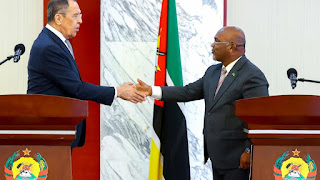In this handout photo released by Russian Foreign Ministry Press Service, Russian Foreign Minister Sergey Lavrov, left, and Minister of Public Works, Housing and Water Resources of Mozambique Carlos Alberto Fortes Mesquita shake hands after a joint news conference following their talks in Maputo capital city of Mozambique, on Wednesday, May 31, 2023. (Russian Foreign Ministry Press Service via AP)
CAPE TOWN, SOUTH AFRICA -- The Russian and Chinese foreign ministers were set to meet with their counterparts from the BRICS economic bloc of developing nations in South Africa on Thursday for discussions that will start with “an exchange of views” on major geopolitical issues, including the war in Ukraine, South Africa's ambassador to the bloc said.
Most of the BRICS countries differ sharply from the position of the U.S. and its Western allies on the war. Speaking ahead of the meeting, the South African ambassador referred to the West's military aid to Ukraine as one of the things that “fuels the conflict.”
“Any endeavor that fuels the conflict does not solve the problem," Anil Sooklal said when asked for his reaction to Western “attempts” to transfer weapons to Ukraine.
“We do not know of any global conflict that has been solved though war,” Sooklal said. “All it does is cause more pain and suffering and, as BRICS countries, this is what we are saying: Let’s focus on finding a peaceful resolution to the challenges, rather than fueling the conflict.”
The BRICS bloc of emerging economies is made of up of Brazil, Russia, India, China and South Africa. Thursday's meeting of those nations' foreign ministers is a precursor to a larger BRICS summit in Johannesburg in August that Russian President Vladimir Putin has been invited to.
It's unclear if Putin will attend but any trip by the Russian leader would put huge diplomatic pressure on South Africa. The country is a signatory to the treaty of the International Criminal Court, which has issued an arrest warrant for Putin on allegations of war crimes for the abduction of children from Ukraine.
South Africa has not clearly stated its position on executing the warrant. Rather, the government has said that it is taking legal advice on its options, a move seen by critics as an attempt to find a way out of its clear obligation to arrest Putin as a signatory to the international court's treaty.
Allowing Putin to travel freely for the summit would likely further strain South Africa's relationship with the West amid accusations by the U.S. that South Africa has provided weapons to Russia for its war in Ukraine.
South Africa has denied that allegation.
On Thursday, Russian Foreign Minister Sergey Lavrov and China's top diplomat, Qin Gang, will clearly be central to the talks at a luxury Cape Town hotel on the southern tip of Africa that looks out over the South Atlantic Ocean. Lavrov has had official talks in at least three African countries on his way to South Africa.
The expansion of the BRICS bloc, and with it a possible strengthening of Russian and Chinese political and economic influence, is also a key topic for discussion, both at the meeting of the foreign ministers and the main BRICS summit in August.
Sooklal said that more than 20 countries had “formally or informally” requested to join the BRICS bloc, among them Saudi Arabia, Iran and the United Arab Emirates, who had submitted official requests.
A bloc containing China, Russia and three of the largest oil-producing nations in the world could be seen as a direct economic challenge to the U.S., some analysts have said, as well as providing some sort of counter to the Group of Seven advanced economies.
With South Africa as the current chair of BRICS, Sooklal said he had prepared a report on possible new members and the process to admit them. That report will go to Lavrov, Qin and the other foreign ministers on Thursday for them to give “guidance” on how to move forward with any expansion.
And foreign ministers from at least 15 other countries from the Global South have also been invited to a second BRICS meeting in Cape Town on Friday, as Sooklal said one of the bloc's stated aims was to address “the major faultlines in the geopolitical front and the economic front” that had been partly caused by an outdated international system.
“This is what BRICS has been championing since its founding," Sooklal said. “That we need a reformed, transformed multilateral system, one that speaks to the current challenges that we are facing and one that is inclusive and that is fair and just and does not marginalize the majority of the global population."
“The majority of the Global South feels that our institutions need reform and that their voices are also equally heard within this context.”___
More AP news on the Russia-Ukraine war: https://apnews.com/hub/russia-ukraine

Comments